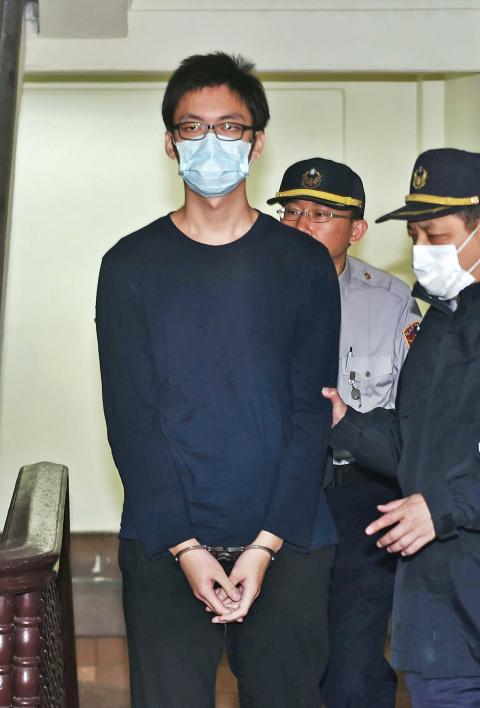Cheng Chieh (鄭捷) — who killed four people and injured 22 in a stabbing frenzy on a Taipei MRT train in 2014 — was executed at 8:47pm last night at the Taipei Detention Center (臺北看守所), Deputy Minister of Justice Chen Ming-tang (陳明堂) said last night.
The Ministry of Justice signed the execution order at 5pm yesterday, and Cheng was executed with three gunshots at the center in New Taipei City’s Tucheng District (土城), Chen said.
Legal experts said the process must have been sped up and expedited by ministry officials, because it was an unusually short time — 18 days — between the Supreme Court upholding Cheng’s death sentence on April 22 and the execution taking place.

Photo: Fang Pin-chao, Taipei Times
Cheng’s lawyers headed to the ministry last night following the announcement to protest against what they called a “rushed decision,” as they were still preparing to file an extraordinary appeal against the death sentence.
Some political commentators have questioned whether there might be a political motive for carrying out the execution so soon, saying that Minister of Justice Luo Ying-shay (羅瑩雪) and President Ma Ying-jeou (馬英九) are trying to calm rising discontent regarding recent judicial decisions.
When speaking to the media yesterday afternoon, Luo said she did not know when Cheng would be executed.
Cheng reportedly told the police directly after his MRT stabbing rampage that he hoped he would be given the death sentence for his crimes and said he had been planning a mass murder since he was in fifth grade.
Cheng said he was under great pressure from his parents and often contemplated suicide, but he did not have the courage to kill himself.
“I had to murder people so I would be convicted for murder and given the death sentence. Only then would my miserable life end,” Cheng reportedly said.

CHAOS: Iranians took to the streets playing celebratory music after reports of Khamenei’s death on Saturday, while mourners also gathered in Tehran yesterday Iranian Supreme Leader Ayatollah Ali Khamenei was killed in a major attack on Iran launched by Israel and the US, throwing the future of the Islamic republic into doubt and raising the risk of regional instability. Iranian state television and the state-run IRNA news agency announced the 86-year-old’s death early yesterday. US President Donald Trump said it gave Iranians their “greatest chance” to “take back” their country. The announcements came after a joint US and Israeli aerial bombardment that targeted Iranian military and governmental sites. Trump said the “heavy and pinpoint bombing” would continue through the week or as long

TRUST: The KMT said it respected the US’ timing and considerations, and hoped it would continue to honor its commitments to helping Taiwan bolster its defenses and deterrence US President Donald Trump is delaying a multibillion-dollar arms sale to Taiwan to ensure his visit to Beijing is successful, a New York Times report said. The weapons sales package has stalled in the US Department of State, the report said, citing US officials it did not identify. The White House has told agencies not to push forward ahead of Trump’s meeting with Chinese President Xi Jinping (習近平), it said. The two last month held a phone call to discuss trade and geopolitical flashpoints ahead of the summit. Xi raised the Taiwan issue and urged the US to handle arms sales to

BIG SPENDERS: Foreign investors bought the most Taiwan equities since 2005, signaling confidence that an AI boom would continue to benefit chipmakers Taiwan Semiconductor Manufacturing Co’s (TSMC, 台積電) market capitalization swelled to US$2 trillion for the first time following a 4.25 percent rally in its American depositary receipts (ADR) overnight, putting the world’s biggest contract chipmaker sixth on the list of the world’s biggest companies by market capitalization, just behind Amazon.com Inc. The site CompaniesMarketcap.com ranked TSMC ahead of Saudi Aramco and Meta Platforms Inc. The Taiwanese company’s ADRs on Tuesday surged to US$385.75 on the New York Stock Exchange, as strong demand for artificial intelligence (AI) applications led to chip supply constraints and boost revenue growth to record-breaking levels. Each TSMC ADR represents

State-run CPC Corp, Taiwan (CPC, 台灣中油) yesterday said that it had confirmed on Saturday night with its liquefied natural gas (LNG) and crude oil suppliers that shipments are proceeding as scheduled and that domestic supplies remain unaffected. The CPC yesterday announced the gasoline and diesel prices will rise by NT$0.2 and NT$0.4 per liter, respectively, starting Monday, citing Middle East tensions and blizzards in the eastern United States. CPC also iterated it has been reducing the proportion of crude oil imports from the Middle East and diversifying its supply sources in the past few years in response to geopolitical risks, expanding